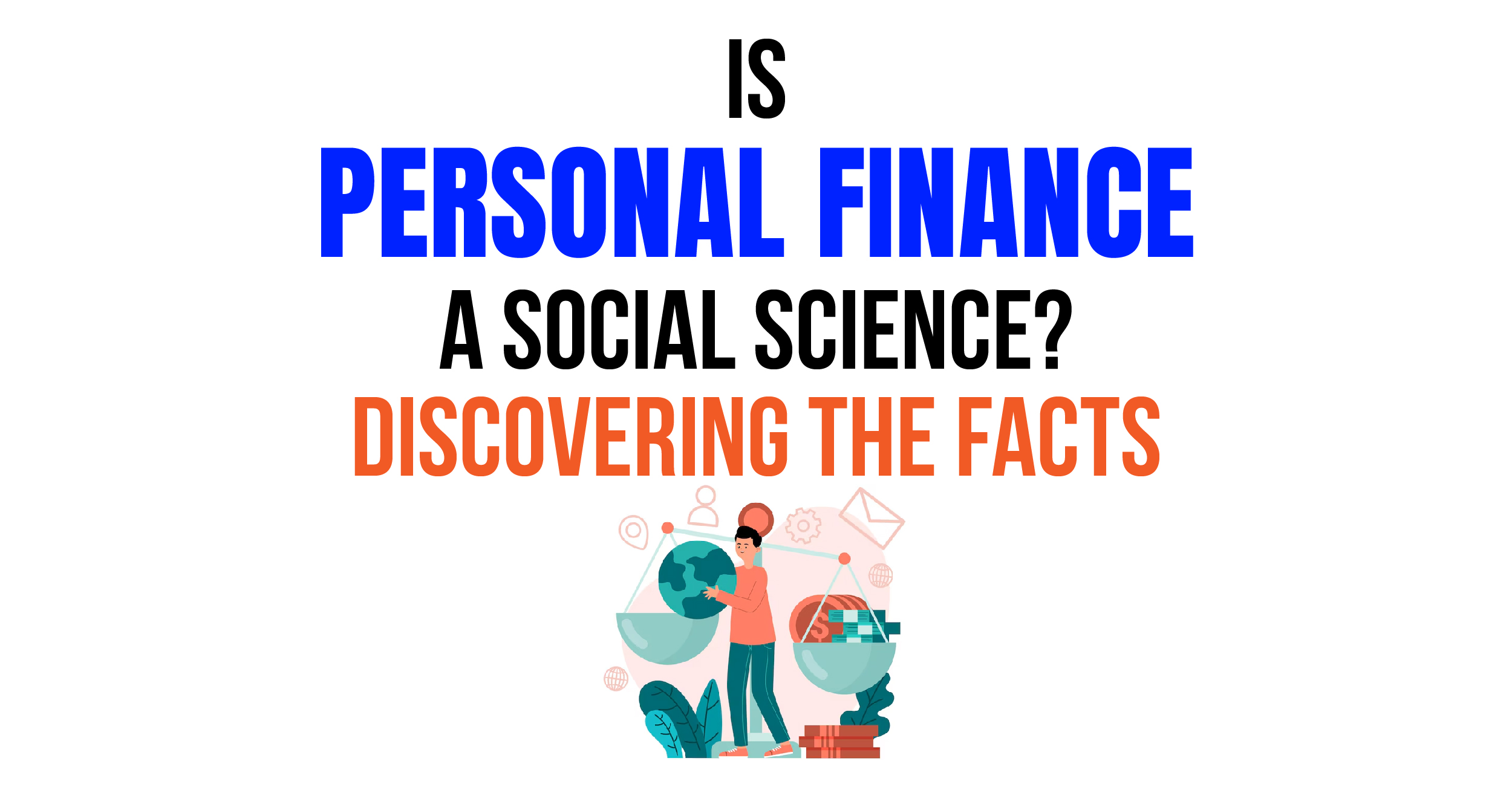Personal finance is not traditionally classified as a social science. It is an applied field focusing on managing individual finances.
Personal finance involves budgeting, saving, investing, and planning for retirement. It helps individuals achieve financial goals and stability. Social science, on the other hand, studies human behavior and societies. Fields like economics, sociology, and psychology fall under social science. Personal finance intersects with these areas but remains distinct.
Understanding personal finance is crucial for making informed financial decisions. It teaches skills necessary for managing money effectively. Learning about personal finance empowers individuals to avoid debt and build wealth. This knowledge is essential in today’s fast-paced economic environment.
Introduction To Personal Finance
Personal finance involves managing your money and planning for the future.
It covers budgeting, saving, investing, and debt management.
Good personal finance skills help people achieve financial stability.
Defining Personal Finance
Personal finance refers to the strategies individuals use to manage their money.
It includes income, expenses, savings, investments, and debts.
Understanding personal finance helps you make informed decisions about your money.
Importance In Everyday Life
Personal finance is important for everyone.
It helps you plan for emergencies and future goals.
Good financial habits lead to less stress and better life quality.
Here are some key benefits:
- Budgeting helps track your income and expenses.
- Saving prepares you for unexpected expenses.
- Investing grows your wealth over time.
- Debt management ensures you don’t overspend.
The Foundations Of Social Science

Social science explores how people interact with society. It includes various academic disciplines. Understanding these foundations helps us grasp personal finance’s role within this field.
Core Disciplines
Social science includes many key areas of study. Some of the core disciplines are:
- Sociology: Studies human social behavior.
- Psychology: Examines mental processes and behavior.
- Economics: Focuses on production, consumption, and distribution of goods.
- Political Science: Analyzes political systems and behavior.
- Anthropology: Investigates human cultures and societies.
These core disciplines provide insights into personal finance. They help us understand how people manage money. They also show the impact of financial decisions on society.
Research Methods
Social science uses various research methods to gather data. These methods include:
- Surveys: Collect data from a large group of people.
- Experiments: Test hypotheses in controlled environments.
- Observational Studies: Observe subjects in their natural settings.
- Case Studies: In-depth analysis of a single subject or group.
These methods help us understand financial behavior. They reveal patterns in spending and saving. They also identify factors influencing financial decisions.
By studying these foundations, we see personal finance as a social science. It connects economic behavior with societal impacts. Understanding this link helps us manage money better.
Intersection Of Personal Finance And Social Science
The intersection of personal finance and social science is a fascinating area. It combines the study of financial decision-making with human behavior and societal influences. This blend helps us understand why people make financial choices and how these choices impact their lives and society.
Behavioral Economics
Behavioral economics is a key area in this intersection. It examines how psychological factors influence financial decisions. People often make irrational choices due to biases and emotions. For instance, they might spend more when they feel happy or stressed.
Understanding these behaviors can help create better financial strategies. For example, knowing that people prefer immediate rewards can lead to better savings plans. Financial planners can use this insight to encourage long-term saving.
Sociological Perspectives
Sociological perspectives also play a vital role in personal finance. Society and culture shape financial behaviors. For example, in some cultures, saving money is highly valued. In others, spending to show wealth is more common.
Social norms and peer pressure can influence financial decisions. People might buy expensive items to fit in with their peers. Understanding these influences can help in creating effective financial education programs.
By examining personal finance through a sociological lens, we can better understand the impact of social structures. This understanding can lead to more inclusive financial policies that consider diverse societal needs.
Personal Finance In Academic Curricula
Personal finance education is gaining traction in academic settings. Many universities now offer courses on managing money. This trend reflects the growing need for financial literacy among students.
University Programs
Universities have started to include personal finance in their curricula. These programs teach students how to manage money effectively.
| University | Program |
|---|---|
| Harvard University | Personal Finance Management |
| Stanford University | Financial Literacy |
| MIT | Money Management Skills |
Each program aims to prepare students for real-world financial challenges. They cover topics like budgeting, saving, and investing.
Interdisciplinary Studies
Personal finance often intersects with other disciplines. It can be part of economics, psychology, or sociology courses.
- Economics: Understanding financial markets and economic principles.
- Psychology: Learning how emotions affect spending habits.
- Sociology: Studying the impact of culture on financial decisions.
Such interdisciplinary approaches enrich students’ understanding of personal finance. They provide a holistic view of money management.
These programs offer a well-rounded education in personal finance. Students gain skills that are crucial for their future.
Impact Of Personal Finance On Society
Personal finance plays a crucial role in shaping society. The way individuals manage their money can have a profound impact on the economic well-being of a community. Understanding personal finance can lead to a more stable and equitable society.
Economic Stability
Personal finance education promotes economic stability. People who manage their money well contribute to a stable economy. They spend wisely, save, and invest. This behavior reduces the risk of financial crises.
When individuals understand personal finance, they are less likely to fall into debt. Debt can lead to economic instability. Teaching personal finance can prevent this. A community with good financial knowledge is more resilient.
Wealth Distribution
Personal finance impacts wealth distribution. Proper financial education can reduce wealth inequality. People with better financial skills can accumulate wealth more effectively.
Wealth distribution affects social harmony. When wealth is more evenly distributed, society is more peaceful. Financial literacy helps achieve fair wealth distribution.
Consider these key points:
- Budgeting helps people manage their income and expenses.
- Savings create a safety net for unexpected expenses.
- Investments allow money to grow over time.
These points illustrate how personal finance can impact wealth distribution and societal harmony.

Credit: indianasocialstudies.com
Critiques And Counterarguments
Personal finance straddles the line between practical skills and academic study. It sparks debates about its classification as a social science. Critics and supporters present strong arguments. Let’s delve into these perspectives.
Skeptical Views
Many skeptics argue that personal finance lacks the depth of social sciences. They state personal finance focuses on practical skills, not on societal behavior. This makes it more of a vocational subject.
Critics also highlight the absence of a theoretical framework. Social sciences like sociology and psychology have established theories. Personal finance often relies on guidelines and rules of thumb.
Another point is the individual focus of personal finance. Social sciences study groups and societies. Personal finance, on the other hand, centers on individual financial decisions.
Supporting Evidence
Supporters argue personal finance involves human behavior and decision-making. This brings it closer to social sciences. For example, concepts like risk tolerance and behavioral finance show psychological aspects.
Furthermore, personal finance examines the impact of economic policies on individual decisions. This aligns with economics, a recognized social science.
Several academic institutions now offer personal finance courses within social science departments. This move reflects a growing recognition of its academic value.
Additionally, personal finance uses data and statistical analysis. This scientific method is a hallmark of social sciences.
Case Studies And Real-world Examples
Understanding personal finance through case studies and real-world examples bridges theory and practice. Real-life scenarios offer valuable insights and practical applications. This section will explore two key areas: Household Budgeting and Investment Behaviors.
Household Budgeting
Household budgeting is a cornerstone of personal finance. Let’s look at a real example. Meet the Smith family. They are a typical middle-class family. They track all their income and expenses.
| Category | Monthly Amount ($) |
|---|---|
| Income | 5000 |
| Rent | 1500 |
| Groceries | 600 |
| Utilities | 200 |
| Savings | 700 |
| Entertainment | 300 |
| Miscellaneous | 200 |
This simple budget shows their financial health. The Smiths save $700 monthly. This ensures they have an emergency fund. It also helps them plan for future expenses. Budgeting helps them avoid debt.
Investment Behaviors
Understanding investment behaviors is crucial. Take John, a 35-year-old professional. John invests in stocks and mutual funds. He follows a disciplined approach.
- John sets clear investment goals.
- He diversifies his portfolio.
- John invests regularly, not just during market highs.
- He stays informed about market trends.
John’s disciplined strategy pays off. His investments grow steadily. This case shows the importance of consistency in investing. Real-world examples like John’s offer practical lessons. They highlight the importance of informed decision-making in personal finance.
Credit: www.google.com
Future Directions In Personal Finance Research
Personal finance has always been a critical field. As new trends emerge, research in this area is expanding. The future looks promising with many exciting directions to explore.
Emerging Trends
New trends are shaping personal finance research. These trends include digital currency, robo-advisors, and financial literacy programs. Each trend offers unique opportunities for study.
| Trend | Description |
|---|---|
| Digital Currency | Research on the impact of Bitcoin and other cryptocurrencies. |
| Robo-Advisors | Study on automated financial advice and its effectiveness. |
| Financial Literacy Programs | Investigating the success of educational programs on personal finance. |
Policy Implications
Research in personal finance affects policy decisions. Understanding emerging trends helps shape effective policies.
- Consumer Protection: Studies on protecting consumers from financial fraud.
- Financial Inclusion: Research on policies to include underserved communities.
- Tax Policies: Examining the impact of tax laws on personal finance.
By focusing on these areas, researchers can provide valuable insights. These insights help policymakers create better financial regulations.

Credit: www.kentuckyteacher.org
Frequently Asked Questions
Is Finance Part Of Social Science?
Yes, finance is part of social science. It studies resource allocation, investments, and financial systems within society.
Is Personal Finance Math Or Social Studies?
Personal finance combines math and social studies. It involves budgeting, saving, investing, and understanding economic factors. Both disciplines are essential.
What Is Personal Finance Considered?
Personal finance involves managing individual or household financial activities, including budgeting, saving, investing, and planning for retirement. It aims to achieve financial stability and goals.
What Is Classified Under Social Science?
Social science includes disciplines like sociology, psychology, anthropology, economics, political science, and human geography. These fields study human behavior, societies, and relationships.
Conclusion
Understanding personal finance as a social science offers valuable insights. It bridges economics, psychology, and sociology. This perspective helps individuals make informed financial decisions. Recognizing its interdisciplinary nature can enhance financial literacy. Embrace personal finance’s broader context to improve your financial well-being.
Explore this fascinating field further to gain comprehensive knowledge.

